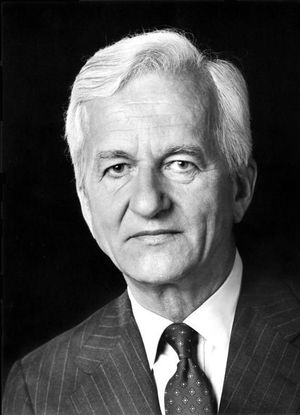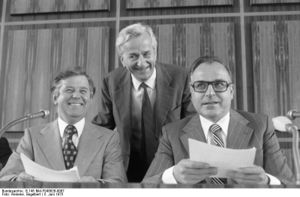ريتشارد فون ڤايتسكر
| Richard von Weizsäcker | |
|---|---|

| |
| Richard von Weizsäcker in 1984 | |
| President of Germany (West Germany until 1990) | |
| في المنصب 1 July 1984 – 30 June 1994 | |
| المستشار | Helmut Kohl |
| سبقه | Karl Carstens |
| خلفه | Roman Herzog |
| Governing Mayor of West Berlin | |
| في المنصب 11 June 1981 – 9 February 1984 | |
| سبقه | Hans-Jochen Vogel |
| خلفه | Eberhard Diepgen |
| تفاصيل شخصية | |
| وُلِد | Richard Karl Freiherr von Weizsäcker 15 أبريل 1920 Stuttgart, Free People's State of Württemberg, Weimar Republic |
| توفي | 31 يناير 2015 (aged 94) Berlin, Germany |
| القومية | German |
| الحزب | Christian Democratic Union |
| الزوج | Marianne von Kretschmann |
| الأنجال | 4 |
| الجامعة الأم | Balliol College, Oxford University of Grenoble University of Göttingen |
| التوقيع | |
Richard Karl Freiherr von Weizsäcker (ألمانية: [ˈʁɪçaɐ̯t fɔn ˈvaɪtszɛkɐ] (![]() listen); 15 April 1920 – 31 January 2015) was a German politician (CDU), who served as President of Germany from 1984 to 1994 (of West Germany 1984–1990 and of the reunited Germany 1990–1994). Born into the Weizsäcker family, who were part of the German nobility, he took his first public offices in the Evangelical Church in Germany.
listen); 15 April 1920 – 31 January 2015) was a German politician (CDU), who served as President of Germany from 1984 to 1994 (of West Germany 1984–1990 and of the reunited Germany 1990–1994). Born into the Weizsäcker family, who were part of the German nobility, he took his first public offices in the Evangelical Church in Germany.
A member of the CDU since 1954, he was elected as member of parliament in 1969. He continued to hold a mandate as member of the Bundestag until he became Governing Mayor of West Berlin, following the 1981 state elections. In 1984, Richard von Weizsäcker was elected as President of the Federal Republic of Germany and in 1989 he was re-elected for a second term. As yet, he is, together with Theodor Heuss, one of only two Presidents of the Federal Republic of Germany, who have served two complete five-year-terms. During his second term as President on 3 October 1990, the reorganized five states of the former German Democratic Republic and East Berlin joined the Federal Republic of Germany (German reunification), which made von Weizsäcker the first democratically legitimized head of state of Germany as a whole since Reich President Paul von Hindenburg had died in office on 2 August 1934.
He is considered the most popular of Germany's presidents,[1] held in high regard particularly for his impartiality.[2][3] His demeanor often saw him at odds with his party colleagues, particularly longtime Chancellor Helmut Kohl. He was famous for his speeches, especially one he delivered at the 40th anniversary of the end of the Second World War in Europe on 8 May 1985. Upon his death, his life and political work were widely praised, with The New York Times calling him "a guardian of his nation's moral conscience".[4]
Relationship with his party and Helmut Kohl
Helmut Kohl, who served as Chancellor of Germany from 1982 to 1998, was an early patron of Weizsäcker's, effectively helping him into parliament. However, their relationship took a first strain in 1971, when Weizsäcker supported Rainer Barzel over Kohl for the CDU-chairmanship. Subsequently, Kohl unsuccessfully tried to deny Weizsäcker the chance to become president in 1983.[5] After he had taken office, Weizsäcker criticized Kohl's government on numerous occasions, taking liberties not previously heard of from someone in a ceremonial role such as his. For instance, he urged the chancellor to recognize the Oder–Neisse line[6] and spoke out for a more patient approach to the journey towards German reunification.[5] Other examples include the aforementioned speech in 1985 and his critique of party politics in 1992. Following a critical interview Weizsäcker gave to Der Spiegel magazine in September 1997, Kohl reacted during a meeting of his parliamentary group by saying that Weizsäcker (whom he called "that gentleman")[7] was no longer "one of us".[8] This was followed by CDU spokesman Rolf Kiefer stating that the CDU had removed Weizsäcker from its membership database, since the former president had not paid his membership fees in a long time. Weizsäcker then took the matter to the party's arbitrating body and won. The tribunal ruled that he was allowed to let his membership rest indefinitely.[8] After his death, Spiegel editor Gerhard Spörl called Weizsäcker the "intellectual alternative medicine to Kohl".[9]
Weizsäcker on his years as Governing Mayor of West Berlin and his views on citizenship.
After his presidency came to an end, Weizsäcker remained vocal in daily politics, e.g. speaking for a more liberal immigration policy, calling the way his party handled it "simply ridiculous".[11] He also spoke out in favour of dual citizenship and a change of German citizenship law from jus sanguinis to jus soli, a view not generally shared by his party colleagues.[12] Towards the former East-German leading party, the PDS (today called Die Linke), Weizsäcker urged his party colleagues to enter into a serious political discussion. He went as far as speaking in favor of a coalition government between Social Democrats and the PDS in Berlin after the 2001 state election.[13]
References
- ^ Augstein, Franziska (15 April 2010). "Erster Bürger seines Staates" (in German). Süddeutsche Zeitung. Retrieved 20 April 2015.
{{cite web}}: CS1 maint: unrecognized language (link) - ^ "Gauck würdigt "großen Deutschen"" (in German). Deutschlandfunk. 11 February 2015. Retrieved 20 April 2015.
{{cite web}}: CS1 maint: unrecognized language (link) - ^ Schäuble, Wolfgang (11 February 2015). "Er ist immer unser Präsident geblieben" (in German). Frankfurter Allgemeine Zeitung. Retrieved 20 April 2015.
{{cite web}}: CS1 maint: unrecognized language (link) - ^ Saxon, Wolfgang (31 January 2015). "Richard von Weizsäcker, 94, Germany's First President After Reunification, Is Dead". The New York Times. Retrieved 1 February 2015.
- ^ أ ب Rudolph 2010, p. 258.
- ^ Rudolph 2010, p. 259.
- ^ خطأ استشهاد: وسم
<ref>غير صحيح؛ لا نص تم توفيره للمراجع المسماةTranslated by User:Zwerg Nase - ^ أ ب Schmidt-Klingenberg, Michael (22 September 1997). "Die Zierde der Partei". Der Spiegel (in German). Retrieved 11 April 2015.
{{cite web}}: CS1 maint: unrecognized language (link) - ^ Spörl, Gerhard (31 January 2015). "Erinnerungen an Richard von Weizsäcker: Er hat uns befreit". Der Spiegel (in German). Retrieved 8 September 2015.
{{cite web}}: CS1 maint: unrecognized language (link) - ^ Weizsäcker 1997, p. 288. Translated by User:Zwerg Nase.
- ^ Rudolph 2010, p. 269.
- ^ Weizsäcker 1997, p. 288.
- ^ Rudolph 2010, pp. 270–271.
ببليوجرافيا
Editions
- Richard von Weizsäcker. Reden und Interviews (vol. 1), 1. Juli 1984 – 30. Juni 1985. Bonn: Presse- und Informationsamt der Bundesregierung. 1986.
- Richard von Weizsäcker. Reden und Interviews (vol. 5), 1. Juli 1988 – 30. Juni 1989. Bonn: Presse- und Informationsamt der Bundesregierung. 1989.
- Richard von Weizsäcker. Reden und Interviews (vol. 7), 1. Juli 1990 – 30. Juni 1991. Bonn: Presse- und Informationsamt der Bundesregierung. 1992.
Monographs and miscellanies
- Gill, Ulrich (ed.) (1986). Eine Rede und ihre Wirkung. Die Rede des Bundespräsidenten Richard von Weizsäcker vom 8. Mai 1985 anläßlich des 40. Jahrestages der Beendigung des Zweiten Weltkrieges (in German). Berlin: Verlag Rainer Röll. ISBN 3-9801344-0-7.
{{cite book}}:|first1=has generic name (help); Invalid|ref=harv(help)CS1 maint: unrecognized language (link) - Hofmann, Gunter (2010). Richard von Weizsäcker. Ein deutsches Leben (in German). Munich: C.H. Beck. ISBN 978-3-406-59809-8.
{{cite book}}: Invalid|ref=harv(help)CS1 maint: unrecognized language (link) - Rudolph, Hermann (2010). Richard von Weizsäcker. Eine Biographie (in German). Berlin: Rowohlt. ISBN 978-3-87134-667-5.
{{cite book}}: Invalid|ref=harv(help)CS1 maint: unrecognized language (link) - Weizsäcker, Richard von (1997). Vier Zeiten. Erinnerungen (in German). Berlin: Siedler Verlag. ISBN 3-88680-556-5.
{{cite book}}: Invalid|ref=harv(help)CS1 maint: unrecognized language (link)
External links
- Correspondence between President Weizsacker and the Israeli President Chaim Herzog during the First Gulf War, published by the blog of Israel State Archives
- Richard von Weizsäcker on the official website of the President's Office
| مناصب سياسية | ||
|---|---|---|
| سبقه Karl Carstens |
President of Germany (West Germany until 1990) 1984–1994 |
تبعه Roman Herzog |
| سبقه Hans-Jochen Vogel |
Mayor of West Berlin 1981–1984 |
تبعه Eberhard Diepgen |
- CS1 errors: generic name
- ريتشارد فون ڤايتسكر
- مواليد 1920
- وفيات 2015
- 20th-century Presidents of Germany
- أشخاص من شتوتگارت
- بارونات ألمانيا
- أسرة ڤايتسكر
- لوثريون ألمان
- عسكريون ألمان في الحرب العالمية الثانية
- خريجو جامعة گوتنگن
- خريجو جامعة أكسفورد
- Université Grenoble Alpes alumni
- Members of the Abgeordnetenhaus of Berlin
- عمد برلين
- رؤساء ألمانيا
- Christian Democratic Union of Germany politicians
- Boehringer Ingelheim people
- حائزو السلسلة الڤيكتورية الملكية
- Recipients of the Order of the Cross of Terra Mariana, 1st Class
- حائزو مرتبة الأسد الأبيض
- Recipients of Geuzenpenning
- Recipients of the Olympic Order
- Honorary Recipients of the Order of the Crown of the Realm
- 20th-century German politicians
- Grand Crosses Special Class of the Order of Merit of the Federal Republic of Germany

